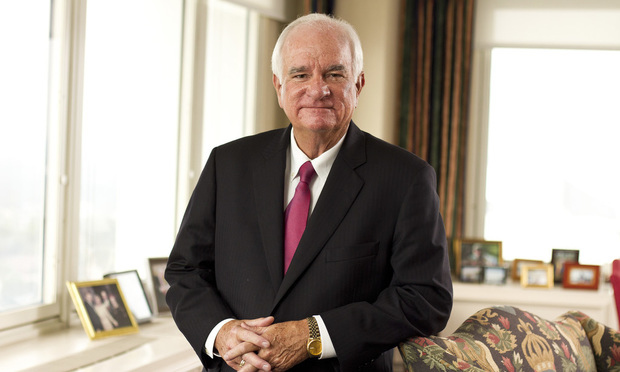Judge: Old Arbitration Agreement Can't Shield Comcast From FCRA Class Action
The plaintiff, a former customer considering coming back to Comcast, said he was on the phone with a representative who initiated a "hard pull" of his credit report without permission, causing his credit score to drop immediately.
October 22, 2019 at 05:07 PM
6 minute read
 Judge Thomas Thrash Jr., chief judge of the U.S. District Court for the Northern District of Georgia. (Photo: John Disney/ ALM)
Judge Thomas Thrash Jr., chief judge of the U.S. District Court for the Northern District of Georgia. (Photo: John Disney/ ALM)
A federal judge in Atlanta rejected arguments by Comcast that a binding arbitration clause in its service contract with a former customer bars a putative class action claiming it pulled Georgian's credit reports without permission.
The suit filed in the U.S. District Court for the Northern District of Georgia said the plaintiff, Michael Hearn, was on the phone with a Comcast representative discussing renewing his service when the rep initiated a "hard pull" of his credit score.
A "hard pull" or "hard inquiry" occurs when a creditor checks a consumer's credit for the purpose of issuing a loan or credit card and can affect a credit score and remain on a credit report for two years.
Hearn's complaint said he immediately received a notification that his credit had been pulled, and a simultaneous notice that his credit score had dropped.
The putative class action Hearn filed in March said he did not sign up with Comcast and was not a customer and that the telecom's representative never requested his Social Security number or told him his credit would be checked.
The complaint, filed by Mason Law Group principal Jonathan Mason, said Comcast's "impermissible access of private and confidential information contained within a consumer's credit report violates the privacy rights conveyed by Congress in enacting the (Fair Credit Reporting Act)."
The lawsuit seeks to certify an "impermissible access" class of anyone in Georgia whose consumer reports "display an inquiry" by Comcast, and who have no open account with the company and no record of a request to open one for the last five years.
A second "impermissible use" class would encompass any Georgia resident whose records were received by Comcast, and for which there is record that the data was reviewed within the last five years.
Comcast responded with a motion arguing that Hearn had signed on with it from 2016 to 2017 and that part of that contract included a binding arbitration clause specifying that "disputes will be arbitrated on an individual basis," and that the obligation to arbitrate "shall survive the termination" of the customer's service.
The contract included a 30-day opt-out period for the arbitration clause, Comcast argued, and there is no record that Hearn ever attempted to do so.
When he contacted Comcast in 2019 to discuss reconnecting his service, Hearn verified the information on file with the company was correct and "alleges that as a part of that interaction, Comcast initiated a credit check without his approval."
Comcast's motion to compel arbitration, filed by Samuel Woodhouse of Woodhouse Law and Michael McTigue Jr. and Meredith C. Slawe of Akin Gump Strauss Hauer & Feld in Philadelphia, said Hearn's complaint violates a Federal Arbitration Act requirement that says any dispute governed by a binding arbitration agreement must be stayed until such arbitration is ordered and concluded.
In an order issued Monday, Chief Judge Thomas Thrash disagreed.
Hearn did not dispute that he signed the 2016 contract, Thrash wrote, but argued he was no longer bound by it after canceling with Comcast the following year. He also argued that the arbitration clause did not apply to FCRA claims, and that if it were deemed to do so, it would be "unenforceable because it is unconscionable."
Thrash agreed with Comcast that the survival clause of the contract "unambiguously reflects the parties' intent that their agreement to arbitrate would survive termination of the 2016 Service Agreement."
But, he said, Comcast's claim that the contract was so broad as to encompass the FCRA dispute—or any dispute between the parties, for that matter—cannot pass judicial muster.
"Unlike the standard arbitration clauses typically found in commercial contracts, the arbitration provision at issue in this case lacks language limiting the scope of arbitrable claims to those 'arising out of' or 'relating to' the 2016 Service Agreement," wrote Thrash, and is "limited only by the requirement that the claim be 'related to Comcast.' This is, of course, no limit at all, as any claim brought against Comcast necessarily 'relates' to it in some way."
Under Comcast's reading of the contract, any current or future claim against it would fall within the scope of the arbitration agreement, Thrash wrote.
"For example," he said, "if the plaintiff was run over by a Comcast truck, he would be required to submit his personal injury claim to arbitration."
Comcast "has not identified a single case in which a court has compelled arbitration of a claim that was (1) unrelated to the agreement containing the arbitration provision and (2) arose after the arbitration provision had expired," Thrash said. "Indeed, the case law interpreting arbitration provisions like the one at issue in this case is sparse and largely unfriendly" to its position.
Citing multiple federal decisions, Thrash said he agreed that absurd results would follow if federal courts compelled arbitration of claims that are substantively and temporally unmoored from the agreements containing the arbitration provisions.
State law governing contract construction also weigh against Comcast, he said, concluding that "no reasonable customer would have understood himself to be signing over his right to pursue any claim against [Comcast] in perpetuity simply by signing a work order acknowledging receipt" of a contract.
"Because the court has determined that the parties did not agree to arbitrate the Plaintiff's FCRA claim, it does not reach the question of whether enforcement of the arbitration provision would be unconscionable," Thrash wrote.
Neither Mason nor Comcast's attorneys responded to requests for comment Tuesday.
This content has been archived. It is available through our partners, LexisNexis® and Bloomberg Law.
To view this content, please continue to their sites.
Not a Lexis Subscriber?
Subscribe Now
Not a Bloomberg Law Subscriber?
Subscribe Now
NOT FOR REPRINT
© 2025 ALM Global, LLC, All Rights Reserved. Request academic re-use from www.copyright.com. All other uses, submit a request to [email protected]. For more information visit Asset & Logo Licensing.
You Might Like
View All
Etsy App Infringes on Storage, Retrieval Patents, New Suit Claims


Silk Road Founder Ross Ulbricht Has New York Sentence Pardoned by Trump
3 minute read
From Courtrooms to Conversations: The Unexpected Joys of Podcasting as a Lawyer
Trending Stories
- 1Buyer Beware:Continuity of Coverage in Legal Malpractice Insurance
- 2‘Listen, Listen, Listen’: Some Practice Tips From Judges in the Oakland Federal Courthouse
- 3BCLP Joins Saudi Legal Market with Plans to Open Two Offices
- 4White & Case Crosses $4M in PEP, $3B in Revenue in 'Breakthrough Year'
- 5Thursday Newspaper
Who Got The Work
J. Brugh Lower of Gibbons has entered an appearance for industrial equipment supplier Devco Corporation in a pending trademark infringement lawsuit. The suit, accusing the defendant of selling knock-off Graco products, was filed Dec. 18 in New Jersey District Court by Rivkin Radler on behalf of Graco Inc. and Graco Minnesota. The case, assigned to U.S. District Judge Zahid N. Quraishi, is 3:24-cv-11294, Graco Inc. et al v. Devco Corporation.
Who Got The Work
Rebecca Maller-Stein and Kent A. Yalowitz of Arnold & Porter Kaye Scholer have entered their appearances for Hanaco Venture Capital and its executives, Lior Prosor and David Frankel, in a pending securities lawsuit. The action, filed on Dec. 24 in New York Southern District Court by Zell, Aron & Co. on behalf of Goldeneye Advisors, accuses the defendants of negligently and fraudulently managing the plaintiff's $1 million investment. The case, assigned to U.S. District Judge Vernon S. Broderick, is 1:24-cv-09918, Goldeneye Advisors, LLC v. Hanaco Venture Capital, Ltd. et al.
Who Got The Work
Attorneys from A&O Shearman has stepped in as defense counsel for Toronto-Dominion Bank and other defendants in a pending securities class action. The suit, filed Dec. 11 in New York Southern District Court by Bleichmar Fonti & Auld, accuses the defendants of concealing the bank's 'pervasive' deficiencies in regards to its compliance with the Bank Secrecy Act and the quality of its anti-money laundering controls. The case, assigned to U.S. District Judge Arun Subramanian, is 1:24-cv-09445, Gonzalez v. The Toronto-Dominion Bank et al.
Who Got The Work
Crown Castle International, a Pennsylvania company providing shared communications infrastructure, has turned to Luke D. Wolf of Gordon Rees Scully Mansukhani to fend off a pending breach-of-contract lawsuit. The court action, filed Nov. 25 in Michigan Eastern District Court by Hooper Hathaway PC on behalf of The Town Residences LLC, accuses Crown Castle of failing to transfer approximately $30,000 in utility payments from T-Mobile in breach of a roof-top lease and assignment agreement. The case, assigned to U.S. District Judge Susan K. Declercq, is 2:24-cv-13131, The Town Residences LLC v. T-Mobile US, Inc. et al.
Who Got The Work
Wilfred P. Coronato and Daniel M. Schwartz of McCarter & English have stepped in as defense counsel to Electrolux Home Products Inc. in a pending product liability lawsuit. The court action, filed Nov. 26 in New York Eastern District Court by Poulos Lopiccolo PC and Nagel Rice LLP on behalf of David Stern, alleges that the defendant's refrigerators’ drawers and shelving repeatedly break and fall apart within months after purchase. The case, assigned to U.S. District Judge Joan M. Azrack, is 2:24-cv-08204, Stern v. Electrolux Home Products, Inc.
Featured Firms
Law Offices of Gary Martin Hays & Associates, P.C.
(470) 294-1674
Law Offices of Mark E. Salomone
(857) 444-6468
Smith & Hassler
(713) 739-1250






